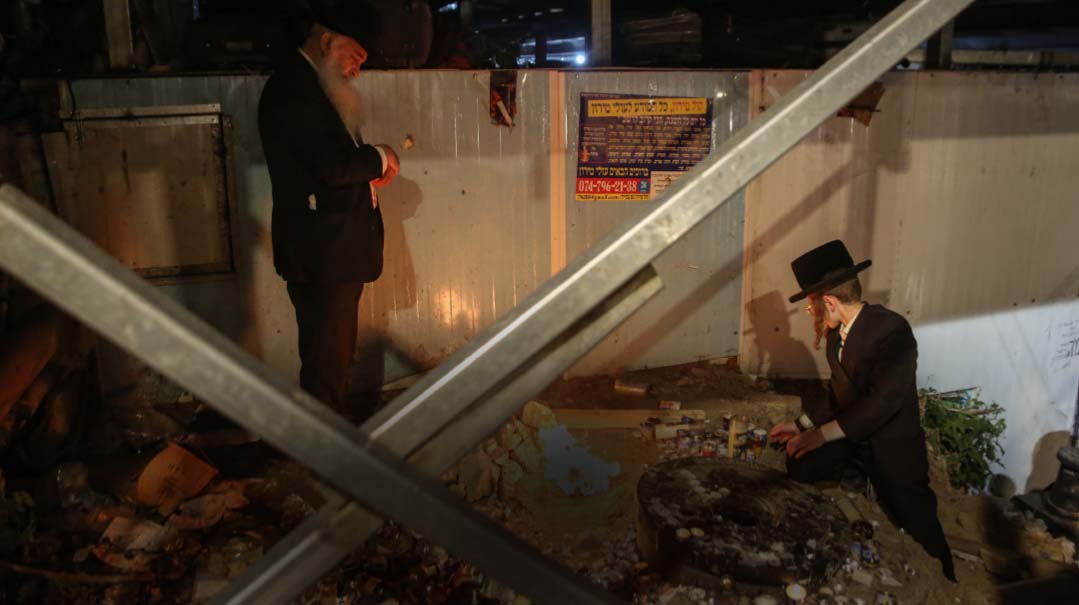Unesaneh Tokef Never Left Us

Reminders of Unesaneh Tokef kept cropping up throughout the year

As I waited to receive the third shot of the Covid vaccine this week, I was already thinking about coming back for the fourth in six months or a year, as experts are predicting. The pandemic, which now comes in almost as many variants as there are countries, has made us vaccine dependent. And as this year draws to a close, this is what now passes for cheerful news.
While we usually kick off the year in shul in the powerful atmosphere of the Days of Awe, this year we started out in the street. And with the highly contagious Delta variant currently raging in Israel, there’s a good chance that this year too we’ll spend Rosh Hashanah masked and huddled in small groups in the open.
Even after the Yamim Noraim came to an end, reminders of Unesaneh Tokef kept cropping up throughout the year. Billboards in chareidi areas were full of petirah announcements, in every community, every age bracket. The plague spared no one. Some families saw both parents die within days or weeks of each other.
Words not heard in decades once again became common parlance — curfews, quarantines, lockdowns. We can no longer freely leave the house, wherever or however we wish. Social distancing directives were enforced cruelly, with law enforcement often enforcing the regulations with more severity than logic. Grandchildren were cut off from their grandparents. The economy stagnated, entire branches of industry were shut down, and hundreds of thousands of Israelis found themselves caught between fear of “corona” and fear for their economic future.
And we had nowhere to turn but to gedolei Yisrael, more than ever in these difficult times. The fear and concern on their faces said everything. For weeks, countless people hung onto every word from the room of Rav Chaim Kanievsky, who several days after Yom Kippur was found to be carrying the deadly virus, until his miraculous recovery.
For the winter zeman, gedolei Yisrael ordered the study halls of the yeshivos to remain open, pleading with yeshivah bochurim and kollel avreichim to take every precaution against infection. The late arrival of winter brought the breathtaking sight of thousands of yeshivah bochurim learning under the open sky.
We soon received a demonstration of how badly we need limud Torah’s protection. Thousands of rockets rained down as Arab Israelis rioted in the mixed cities. But if we have yet to achieve peace with our closest neighbors, at least we managed to break through the boycott by the oil-rich Gulf states, signing peace agreements with the UAE, Bahrain, and Morocco.
Meanwhile, Binyamin Netanyahu, who oversaw this achievement, was finally relegated to the opposition benches. Although Israeli voters failed to deliver a decisive verdict in the election, the center left finally formed a government under Naftali Bennett, who scored just seven seats (and one of his MKs refused to follow him into the coalition with the left).
The importance of safety measures was sadly brought home in another way, not related to the pandemic. After the previous year’s lockdowns, this Lag B’omer thousands of Jews flocked to Meron, celebrating with rising joy at Toldos Aharon’s hadlakah. As participants began pouring out of the Kever Rashbi compound through a narrow pathway, a tremendous crush built up. People slipped and fell on top of each other and couldn’t breathe. Those at the back of the crowd couldn’t see what was happening and continued pushing on, causing dozens to die.
But while even that was too much to bear, only two weeks had passed when on Erev Shavuos, minutes before shkiah, the bleachers collapsed at the Karlin beis medrash in Givat Ze’ev, killing three and injuring 220.
As believing Jews, we know that the last years before the geulah will be the most painful of all, and maybe, just maybe, that’s where we are.
Tichleh shanah v’kaleloseha, tacheil shanah u’birchoseha.
"This isn’t my seat”
explained MK Itamar Ben Gvir, sworn in for the first time after Israel’s fourth election in two years. On his first day in the Knesset, he found that he hadn’t been assigned a seat on the benches due to an oversight.
“I guess they want me to sit at the government table,” Ben Gvir quipped before sitting in the first unlabeled seat he could find.
“You don’t need a name plate, everyone knows who you are,” called out a photographer who hurried to capture the new MK’s first entry to the plenum.
(Originally featured in Mishpacha, Issue 876)
Oops! We could not locate your form.













